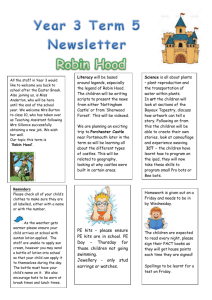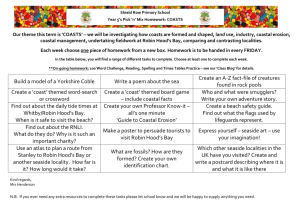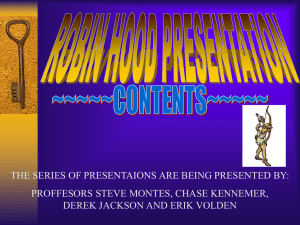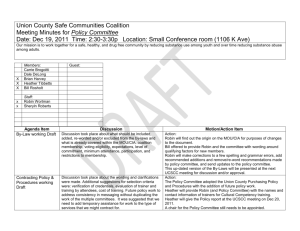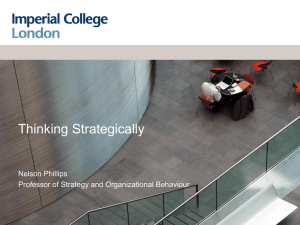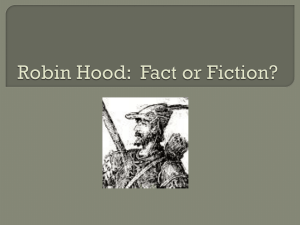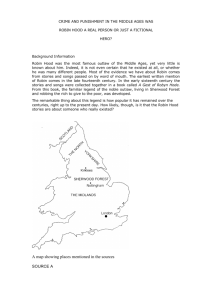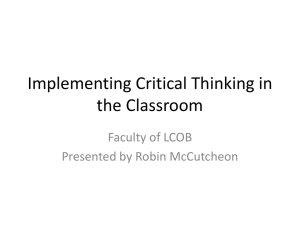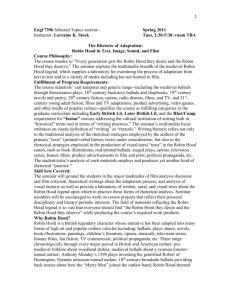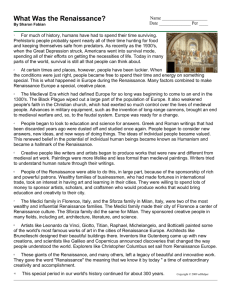Test 2-demo version - Language opens doors
advertisement
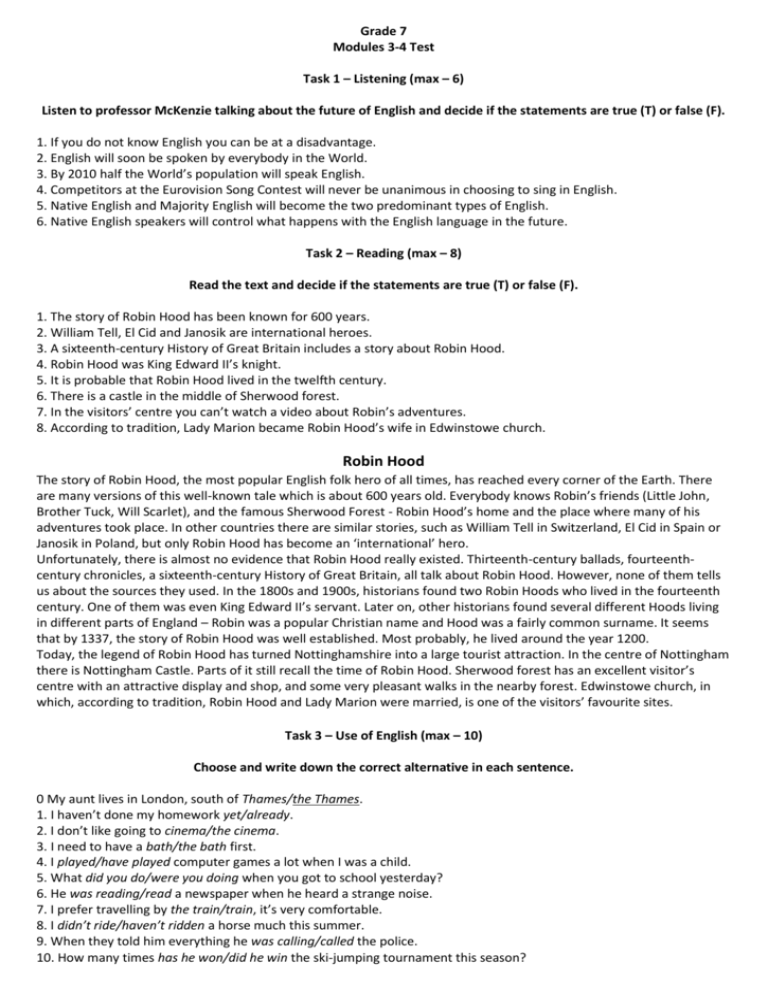
Grade 7 Modules 3-4 Test Task 1 – Listening (max – 6) Listen to professor McKenzie talking about the future of English and decide if the statements are true (T) or false (F). 1. If you do not know English you can be at a disadvantage. 2. English will soon be spoken by everybody in the World. 3. By 2010 half the World’s population will speak English. 4. Competitors at the Eurovision Song Contest will never be unanimous in choosing to sing in English. 5. Native English and Majority English will become the two predominant types of English. 6. Native English speakers will control what happens with the English language in the future. Task 2 – Reading (max – 8) Read the text and decide if the statements are true (T) or false (F). 1. The story of Robin Hood has been known for 600 years. 2. William Tell, El Cid and Janosik are international heroes. 3. A sixteenth-century History of Great Britain includes a story about Robin Hood. 4. Robin Hood was King Edward II’s knight. 5. It is probable that Robin Hood lived in the twelfth century. 6. There is a castle in the middle of Sherwood forest. 7. In the visitors’ centre you can’t watch a video about Robin’s adventures. 8. According to tradition, Lady Marion became Robin Hood’s wife in Edwinstowe church. Robin Hood The story of Robin Hood, the most popular English folk hero of all times, has reached every corner of the Earth. There are many versions of this well-known tale which is about 600 years old. Everybody knows Robin’s friends (Little John, Brother Tuck, Will Scarlet), and the famous Sherwood Forest - Robin Hood’s home and the place where many of his adventures took place. In other countries there are similar stories, such as William Tell in Switzerland, El Cid in Spain or Janosik in Poland, but only Robin Hood has become an ‘international’ hero. Unfortunately, there is almost no evidence that Robin Hood really existed. Thirteenth-century ballads, fourteenthcentury chronicles, a sixteenth-century History of Great Britain, all talk about Robin Hood. However, none of them tells us about the sources they used. In the 1800s and 1900s, historians found two Robin Hoods who lived in the fourteenth century. One of them was even King Edward II’s servant. Later on, other historians found several different Hoods living in different parts of England – Robin was a popular Christian name and Hood was a fairly common surname. It seems that by 1337, the story of Robin Hood was well established. Most probably, he lived around the year 1200. Today, the legend of Robin Hood has turned Nottinghamshire into a large tourist attraction. In the centre of Nottingham there is Nottingham Castle. Parts of it still recall the time of Robin Hood. Sherwood forest has an excellent visitor’s centre with an attractive display and shop, and some very pleasant walks in the nearby forest. Edwinstowe church, in which, according to tradition, Robin Hood and Lady Marion were married, is one of the visitors’ favourite sites. Task 3 – Use of English (max – 10) Choose and write down the correct alternative in each sentence. 0 My aunt lives in London, south of Thames/the Thames. 1. I haven’t done my homework yet/already. 2. I don’t like going to cinema/the cinema. 3. I need to have a bath/the bath first. 4. I played/have played computer games a lot when I was a child. 5. What did you do/were you doing when you got to school yesterday? 6. He was reading/read a newspaper when he heard a strange noise. 7. I prefer travelling by the train/train, it’s very comfortable. 8. I didn’t ride/haven’t ridden a horse much this summer. 9. When they told him everything he was calling/called the police. 10. How many times has he won/did he win the ski-jumping tournament this season? Task 4 – Use of English (max – 7) Read the text and put the verbs in brackets into the Past Simple, the Past Continuous or the Present Perfect. I (0) ____met______ (meet) Carmela two years ago when I (1) _____________ (be) in Madrid on a business trip. I (2) _____________ (sit) in a café with some business partners when a beautiful young waitress (3) _____________ (come up) to us to take the order. I (4)_____________ (speak) to her in my broken Spanish and we (5) _____________ (fall) in love with each other at first sight. The next day we (6) ___________ (have) our first date. This year she (7) _____________ (visit) me in Poland twice. Task 5 – Use of English (max – 8) Complete the sentences with the correct form of the word in brackets. 0. There are more and more __homeless___ (home) people in India. 1. My new job gives me financial ____________ (independent) from my parents. 2. The Smiths didn’t want to do business with him when they learnt that he was very _____________ (honest). 3. This extra money will _____________ (able) him to travel to Canada and the States. 4. Tom’s mother became ____________ (suspect) when he returned home after midnight. 5. I think Sara is not a good journalist because of her ____________ (able) to listen to other people. 6. I didn’t like classes in the morning but I loved evening _____________ (active). 7. After the accident my leg was so ____________ (pain) that I couldn’t walk. 8. John’s first marriage was _____________ (success), so he got divorced and married again. 5: 35 - 39 4: 29 - 34 3: 23 - 28 The Keys Task 1 – Listening (max – 6) 1. True, 2. True, 3. False, 4. False, 5. True, 6. False Task 2 – Reading (max - 8) 1 T; 2 F; 3 T; 4 F; 5 F; 6 F; 7 T; 8 T Task 3 – Use of English (max – 10) 1. 2. 3. 4. 5. 6. 7. 8. 9. 10. yet the cinema a bath played did you do was reading train haven’t ridden called has he won Task 4 – Use of English (max – 7) 1. 2. 3. 4. 5. 6. 7. was was sitting came up spoke fell had has visited Task 5 – Use of English (max – 8) 1. 2. 3. 4. 5. 6. 7. 8. independence dishonest enable suspicious inability activities painful unsuccessful
